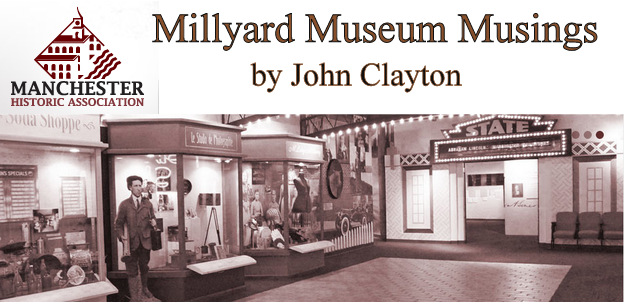
Oh what I wouldn’t give to be sitting in one of my old classrooms at Manchester High School West tomorrow when the teachers – female teachers, in particular – get around to addressing the issue I am about to raise.
In fact, there’s probably going to be some lively give-and-take in schools all over the city when educators are reminded that there was a time in Manchester’s past when women teachers were relieved of their duties due to the simple fact that they were married.
The cauldron started to bubble in 1919 when, in a front-page story, The Manchester Union reported that, “Good authority says that some members of the school committee are already planning to institute measures designed to clear the schools of married teachers taken on during the war period.”
That was The Great War, which – in addition to pitting America and its allies against The Hun – also brought some changes here in Manchester.
“When the United States went into the war,” The Union noted, “so many teachers went into one or another sort of war work that the hiring of married teachers became an absolute necessity to fill the vacancies on the city’s teaching staff.”
To some, it was an ugly necessity, which makes this a good time to introduce one of the knuckleheads, numbskulls and Neanderthals who served on the school board back then.
“Committeeman Edward Healy of Ward 8, in discussing the problem, stated that he believed that the place of a married woman was in the home,” The Union reported. “He said that he had no objections to the employment of widows or of teachers who are obliged because of incapacity of the husband to support a family, but it was his belief that married women who were supported by their husbands should not be employed as teachers.”
I wish I could tell you this type of argument was limited to the Queen City, but alas, it was a nationwide phenomenon, and in an eye-popping book called “The Teacher’s Voice,” author Richard Altenbaugh reports on claims that “the presence of so many women in education feminized the institution and emasculated male students, resulting in a weak nation,” while also “subverting men’s dominant role, both in the workplace and in the home.”
Bear in mind, “no laws or rules say that married teachers shall not be hired,” The Union explained, “(but) it is claimed that they do not have the time to properly attend to their teaching duties and that in many cases, they lack the real interest in their work which they should have (so) the matter of keeping them off the teaching staff is largely a matter of public sentiment.”
It soon became apparent that the newspaper didn’t exactly have its thumb on the pulse of Manchester on that issue, as outraged citizens – many of them women – began to lodge formal, forceful complaints.
Mrs. Arnold Yantis “claims it would be just as arbitrary to bar married men from the schools as it would be to bar married women.”

Alderman Albert Clough objected, as did Dr. Walter Smith, pastor of the Methodist Episcopal Church, while Elizabeth Brown Stearns cited a report from the Carnegie Foundation “which gives as the result of their exhaustive inquiry the decision that married teachers are superior to unmarried.”
Members of the school board – 13 men, mind you – were largely unmoved by their arguments. It took time, but by June 1921, as more and more doughboys were returning from the pacified battlefields of Europe, the school board voted 9-to-4 to purge 16 married women teachers from the school district.
Among them were Mrs. Ora Gould Littlefield from the high school – Manchester only had one back then – plus Mrs. Eva Barndollar of the Wilson School, Mrs. Hattie Schellenburg of the Franklin School, Mrs. Katherine Bastian of the Parker School and Mrs. Ethel Aldrich of the Mosquito Pond School.
Protests became more organized, and petitions multiplied.
One said, “Voted that: The Federation of Women’s Clubs protest the refusal of the school committee to re-elect 16 married women teachers now teaching in the public schools and to request their reinstatement.”
When the school committeemen again turned a deaf ear, The Federation of Women’s Clubs matched its earlier rhetoric with a call to action.
An extremely long sentence in The Union reported that, “Undismayed by defeat before the Manchester School Board in their efforts to give married women a fair chance, as they believe, to teach in the public schools, members of The Federations of Women’s Clubs are organizing for the next municipal campaign with the view of defeating some of the members of the board who led the fight against them and who are responsible, they maintain, for the passage of a vote which makes married women ineligible to election as teachers in the public schools of Manchester.”
True to its word, The Federation recruited “some of the most highly educated and influential women in the community” to run for school board.
Those candidates were Dr. Zatae Straw in Ward 3, Mrs. Mabel H. Riley in Ward 4 and Mrs. Evangeline Merrill in Ward 10, and, based on the coverage in The Union, their presence on the ballot struck genuine fear in the heart of the entrenched incumbents.
“Heavy Election Vote Forecast,” The Union intoned as voters headed to the polls on Nov. 8, 1921. “Women Uncertain Factors,” the sub-head added.
“That the vote of the women is carrying great uncertainty among the political prophets was very evident today in the polling places,” the paper reported, “as women (were) flocking to the ballot boxes in groups of two, three, five and six.”
And then the dream died.
“In the election of the school committee, over which more than usual interest had prevailed owing to the entrance of three women candidates in the fight, L. Ashton Thorp carried Ward 3 over Dr. Zatae Straw, Arthur J. Kennedy defeated Mrs. Mabel Riley and Benjamin Mack was accorded a victory over Mrs. Evangeline Merrill in Ward 10,” The Union reported the next day.
“The election of these three members of the board… assured a board of ‘men only’ for the next two years,” it concluded.
It would take years for the school board to see the light when it came to hiring married women teachers, but to those of you who are out there today – if I may borrow a dated and commercial feminist slogan – I’m happy to say, “You’ve come a long way, baby!”

John Clayton is Executive Director of the Manchester Historic Association. You can reach him with your historical (or existential) questions at jclayton@manchesterhistoric.org.
 You’re one click away! Sign up for our free eNewsletter and never miss another thing
You’re one click away! Sign up for our free eNewsletter and never miss another thing







